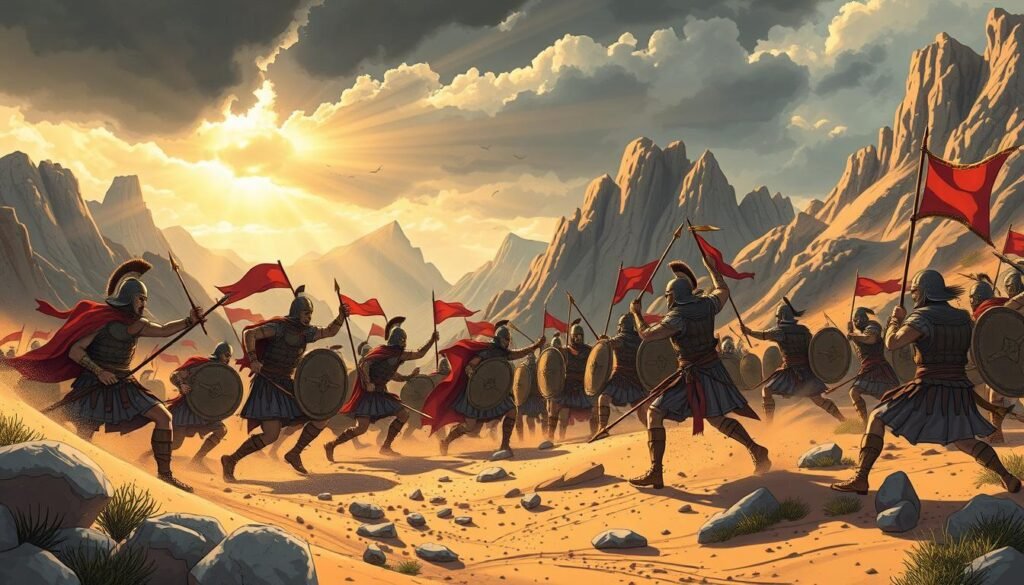Ever thought about why some biblical figures are so remembered, even with short reigns? King Abijah is a great example. He ruled Judah from about 913 to 911 BC. His time was marked by battles and family connections that changed Israel’s history.
This look into King Abijah’s life shows his importance in the Bible. It also makes us think about the mixed feelings people have about him.
Introduction to Abijah
Abijah was the son of King Rehoboam. He was a king of Judah and Israel. His time as king was from 913 to 911 B.C.
He was a descendant of King David. This makes his story very important in the Bible. It shows how faith and family are key in God’s plan.
Abijah’s rule was short, just three years. Yet, his story is full of ups and downs. He had a big win against Jeroboam, even when things looked bad.
His faith and bravery in battle show his character. They also highlight the importance of being righteous and having God’s support.
Abijah’s family ties are also interesting. He is part of Jesus Christ’s family tree, as Matthew shows. This makes him very important in the story of salvation.
Today, Abijah’s story teaches us about keeping faith through generations. Learning about Abijah helps us see his role in the Bible’s history. It shows how his story affects us all.
Historical Context of Abijah’s Reign
Abijah, also known as Abijam, ruled Judah after the United Kingdom of Israel split. His time in power was from 914 BC to 911 BC. It was filled with war and big challenges.
The split into two kingdoms made things very tense. Israel was in the north, and Judah was in the south. This led to many fights and power struggles.
Abijah had a big fight with Israel, led by King Jeroboam. He was outnumbered two to one. But he trusted in God, which helped him win.
God helped Abijah a lot, causing Israel to lose 500,000 soldiers. This showed how hard times were for Judah.
Abijah’s time was shaped by the split kingdom. He had to deal with many battles. He also had to follow God, even when it was hard.
He was the son of Rehoboam and had to face many challenges. His short but important time in power showed the struggles of the divided kingdom.
Abijah’s Family Background
Abijah’s family gives us clues about his character and rule. He was born to Rehoboam and Maakah. Their relationship shaped Abijah’s reign.
Rehoboam made choices that hurt the kingdom of Judah. This led to Israel’s division. Abijah had to deal with this complex situation.
Parents: Rehoboam and Maakah
Rehoboam’s reign was marked by trouble, like the northern tribes’ rebellion. His queen, Maakah, was very important in the kingdom. She was a symbol of royal power.
Abijah’s rule was influenced by his parents. After Abijah, his brother Asa took over. Asa removed Maakah because of her idolatry. This shows the family’s problems.
Significance of his Family Lineage
Abijah was part of the Davidic line. Being a descendant of King David meant he had special duties and blessings. The Bible shows God’s favor for David’s family.
Abijah’s royal bloodline meant he had to lead like David. This brought both challenges and chances during his time as king.

Who Is Abijah In The Bible?
Abijah was a king of Judah and the son of Rehoboam. He ruled for only three years, from 913 to 911 BC. His army faced a huge challenge, with 400,000 men against King Jeroboam’s 800,000.
Despite the odds, Abijah won a big victory. This victory weakened Jeroboam and helped lead to his downfall.
Abijah had a big family with fourteen wives, twenty-two sons, and sixteen daughters. His mother, Maacah, was very important during his time as king.
But, Abijah didn’t always follow God’s ways. This part of his life is also in the Bible.
After Abijah died, Judah had ten years of peace. This shows his actions had a lasting effect on the kingdom.
Abijah’s life was full of ups and downs. It shows how complex being a king and a person can be in the Bible.
Abijah’s Reign in Judah
Abijah was king for three years, from about 913 to 911 BC. He faced many challenges, especially from King Jeroboam of Israel. These conflicts made his rule hard.
Abijah fought many battles. These fights showed his dreams and his limits as a leader. His efforts to win the northern tribes led to war.
Duration and Challenges Faced
Even though Abijah was king for just three years, his time had a big impact on Judah. He always fought against Jeroboam. This war changed the political scene a lot.
The Judean army won battles, even when they were outnumbered. This showed they believed in God’s help. These battles were very important for Abijah’s rule and hinted at future changes.
The Aftermath of His Reign
After Abijah died, his son Asa became king. Asa started a new chapter for Judah. For ten years, there was peace between Judah and Israel.
This peace let Asa grow his power and make changes. Abijah’s legacy helped Asa’s plans. Asa’s leadership was shaped by what happened during Abijah’s time.
Military Campaigns and Accomplishments
Abijah’s short time as king was filled with big military wins. One key event was the Battle of Mount Zemaraim. Here, Abijah led 400,000 soldiers against Jeroboam’s 800,000.
Abijah believed God was with him, which gave his soldiers strength. The Battle of Mount Zemaraim shows how faith can lead to victory, even when outnumbered.

Abijah won many battles against Jeroboam, making Judah stronger. He took important cities like Bethel and Jeshanah. These wins showed Abijah’s military skill and his faith in God.
Abijah’s military wins were mixed with spiritual failures. He started to worship idols, which was wrong. This mix of success and failure shows the complex nature of his reign. It teaches us about the balance between power and faith during hard times.
Prophetic Insights and Legacy
Abijah’s short reign of three years shows the complex mix of prophecy and leadership in the Bible. His story teaches us that being a leader is more than just winning battles. His legacy is a mix of his military wins and his lack of spiritual focus.
Abijah was known for his knowledge of God. He trusted in God and won many battles, including against King Jeroboam. But, his actions were not always good, as history shows.
Prophets during his time said God guides leaders for a bigger purpose. Abijah showed strength in some moments but failed in others. This shows the big responsibility leaders have and the need to always follow God.
Looking at Abijah’s legacy, we see a story of both good and bad. The Bible teaches us to look at a leader’s whole story, not just their wins. Abijah’s story reminds us of the importance of being true to oneself as a leader.
Religious and Moral Standing
Abijah’s religious and moral standing is very important. We look at his character, especially because of his family line. The comparison of Abijah and Rehoboam shows what was expected of David’s descendants.
Abijah had some good spiritual qualities. But, he also made mistakes like his dad, Rehoboam. This shows the hard times he faced in leading.
Comparison to His Father, Rehoboam
Abijah’s time as king was a battle between faith and idolatry. His moral level was not as high as his ancestors, like King David. The Bible says he followed in Rehoboam’s sinful ways, showing he didn’t fully commit to leading well.
This shows how important it is to really believe in God. Abijah’s mixed heart caused trouble in Judah. It makes us think about our own faith and how it affects us.
Lessons from His Conduct
The lessons from Abijah’s reign teach us about the need for strong faith and moral integrity. His story warns us that not fully committing to faith can lead to bad results. Abijah’s actions show that true faith is not just believing but also acting on it.
His story teaches leaders today about the importance of biblical lessons on leadership. It shows how crucial it is to be accountable and have a strong spiritual base. Even with his flaws, Abijah’s story shows that a heart open to God can still find grace.
Impact on Future Generations
Abijah’s short time as king in Judah had a big impact. His three years of rule were filled with fights with Jeroboam. But, it also led to big changes in the nation.
His son, Asa, became king next. Asa used his father’s lessons to make big changes. He made Judah turn away from idols and back to God.
Asa’s rule was very different from his father’s. He showed that leaders can change things for the better. His actions made the kingdom stronger and helped people follow God again.
The line of kings from David, including Abijah, is very important. It leads to Jesus Christ, the promised King. This story also shows how mothers and women can shape the future. Abijah’s son, Hezekiah, was influenced by his mother’s teachings.
FAQ
Who was Abijah in the Bible?
Abijah, also known as Abijam, was a king of Judah. He ruled from about 913 to 911 BC. He was the son of Rehoboam and fought many battles.
What were the main challenges faced by Abijah during his reign?
Abijah had big challenges, mainly from King Jeroboam of Israel. They fought many battles. This made Judah and Israel very tense.
How did Abijah’s military campaigns shape his legacy?
Abijah’s battles, like the Battle of Mount Zemaraim, made him famous. He won, even though he was outnumbered. This showed he trusted God and made Judah stronger.
What is the significance of Abijah’s family background?
Abijah came from a special family. His parents, Rehoboam and Maakah, were important. Being related to King David helped him claim the throne.
How did Abijah’s actions influence the reign of his successor, Asa?
After Abijah died, his son Asa started big changes. Asa made Judah less like the other kingdoms. This was because of what happened during Abijah’s time.
What lessons can be drawn from Abijah’s reign regarding leadership?
Abijah’s story teaches us about being a good leader. He shows what happens when leaders forget God. This is a lesson for today’s leaders.
How did Abijah’s reign reflect the political landscape of his time?
Abijah ruled when Israel was split. This made his battles and plans to unite Israel very important. It shows how hard it was to lead back then.
What are the prophetic insights related to Abijah?
The prophets spoke a lot during Abijah’s time. Their words tell us about his actions and leadership. They remind us of the importance of following God’s will.

Rockin’ the faith, one verse at a time!
Growing up, the Bible’s stories deeply impacted me. Now, with over 15 years of preaching experience, I blend timeless teachings with modern technology, making them relevant for today’s world.
Bible Hub Verse is my platform to share historical insights and thought-provoking articles, exploring both familiar and uncommon Christian topics. My passion is building a welcoming online space for everyone to learn, grow in their faith, and discover the Bible’s enduring message.
Join the journey!
God bless you.









